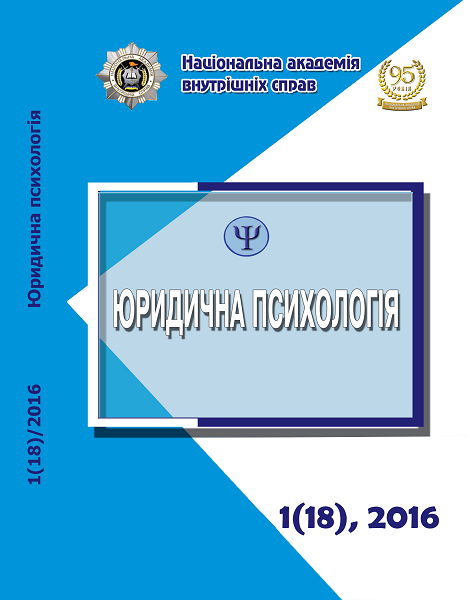Vocational and Psychological Training of Servicemen of the National Guard of Ukraine
Keywords:
professional and psychological training, psychological readiness, combat stress factors, psychological strip simulate combat operations and tasks in daily life activities, fighting, anti-terrorist operation
Abstract
In the article the draft system of vocational and psychological training of servicemen of the National Guard of Ukraine at different stages of service and combat missions in extreme (combat) conditions. The analysis of the research results of war in other countries and the initial research psychologists National Guard of Ukraine during anti-terrorist operations that have common conclusions. In the system of vocational and psychological training of military personnel, weighty significance is the work of psychologists at the stage of guards to perform service and combat missions. The features and the introduction of special training combat experience in service and combat missions in the zone of the antiterrorist operation in the east of Ukraine and in the protection of public order in terms of events in the nation’s capital. The increasing role of psychological factors in modern wars and local conflicts, of military service and law enforcement units demonstrated during the antiterrorist operation in the Donetsk and Lugansk regions of Ukraine. The need for a short time to improve the combat readiness of units, psychological readiness of personnel in terms of the interactions of the various categories of military personnel (fixed-term and contract services, different motivational orientation of the antiterrorist operation tasks and the like); the need for the introduction of a new combat experience in the training of personnel to implement the service tasks entrusted to the National guard of Ukraine demand change of approaches to the issues of professional psychological training of personnel, and the building of educational material resources. Combat doctrine is the basis for building effective units, but the actual events of service and combat tasks can be quite different from the scenarios of the exercises. This necessitates a system of providing service and combat readiness of servicemen in similar situations and after them, from commander to private. Flexibility and the ability to adapt is the Foundation of psychological readiness of the commander. The task of the military psychologist in the vocational training system to perform tasks of service in extreme (combat) conditions aimed at formation of readiness of the military to combat the effects of stress factors. In addition, each soldier should realize that any reaction of his body to extreme (combat) conditions is a normal reaction to abnormal circumstances, he also should have the skills of psychological first aid self-regulation of emotional state.Downloads
Download data is not yet available.
Abstract views: 269 PDF Downloads: 536
Issue
Section
Psychological support of law enforcement
- Authors reserve the right to authorship of their own work and transfer to the magazine the right of the first publication of this work under the terms of the Creative Commons Attribution License, which allows other persons to freely distribute published work with mandatory reference to authors of the original work and the first publication of an article in this magazine.
- Authors have the right to enter into separate additional agreements on non-exclusive dissemination of the work in the form in which it was published in the journal (for example, to post an article in the institution's repository or to publish as part of a monograph), provided that the link to the first publication of the work in this journal is maintained.
- The journal's policy allows and encourages the posting of articles by authors on the Internet (for example, in electronic storehouses of institutions or on personal websites), both before the submission of this manuscript to the editorial office and during its editorial processing, as this contributes to the creation of a productive scientific discussion and positively affects the efficiency and dynamics of citing the published work.




